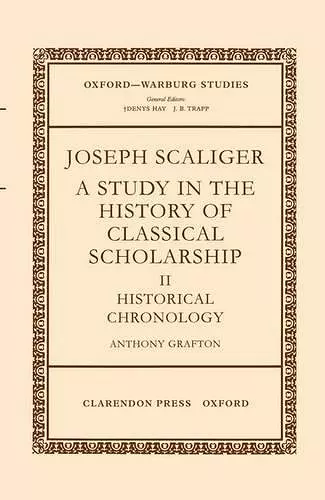Joseph Scaliger: II: Historical Chronology
Format:Hardback
Publisher:Oxford University Press
Published:16th Dec '93
Currently unavailable, and unfortunately no date known when it will be back

During the fifteenth and sixteenth centuries technical chronology, the study of calendars and of dates in ancient and medieval history, was both a fashionable and a controversial discipline. Theologians debated the dates of the Creation, the Flood, and the Crucifixion. Astronomers and historians argued about the identity of the eclipses that could supply absolute dates for events long past. Classical scholars reconstructed the religious beliefs and political practices that had governed the Greek and Roman calendars. Clerics and consultant experts, finally, debated what was to be done to mend the obviously faulty calendar of the western Church. Poliziano and Pico, Luther and Melanchthon, Copernicus and Kepler all studied and wrote about chronology. Late in the 1570s Joseph Scaliger (1540-1609) turned his attention to this field. He had already established himself as an innovative and ingenious editor of Latin texts, as the first volume of this study showed. But he now became one of the most celebrated scholars in Europe. He synthesized the work of dozens of other scholars, many of them now forgotten. He started or took part in many technical debates. And on such central problems as the date and nature of the Last Supper, the reliability of the various Old Testament texts, and the worth of the fragmentary historians of the ancient Near East, he showed remarkable erudition and insight. This book tells the stories of chronology and of Scaliger himself. It describes the scholarly circles in which he moved - above all the University of Leiden, the most innovative in Europe, where he spent the last decade and a half of his life. And it reconstructs his relations with contemporary scholars and scientists - notably Tycho Brahe and Johannes Kepler - and his remarkable, if wholly unofficial, career as a teacher. It is a sequel to volume I: Textual Criticism and Exegesis, published in 1983.
'a remarkably rich insight into a vigorous period of scholarship for which the modern world, even the world of Classical learning and history, has little taste.' 'Grafton's weighty and copiously annotated volume does more than justice to this side of Scaliger's life. It is a model of erudition and flourished prose of a sort that fits Scaliger far better than purple robes ever did.' The London Review of Books
After the passage of a dacade, it is a pleasure to salute the appearance of the second volume ... Grafton assesses as well as describes, and he is not afraid to point out the master's errors ... his conclusion is fundamentally positive, commending the work for 'its intellectual ambition, its richness in detail' and 'its willingness to depart from ancient testimony and modern dogma' ... his hero's extraordinary range of interests, knowledge and skills is made clear for the first time ... he has resurrected him, and, still more important, he has resurrected his work ... In so doing, he has done a signal service to Renaissance studies ... anyone interested in late Renaissance humanism or in the history of historical writing cannot afford to ignore it. * Renaissance Studies, Vol 8 No 3 *
highly technical book ... G.'s monumental book is rewarding and instructive ... G.'s even-handed apportionment of credit and discredit, both to Scaliger and to his critics, invites and will receive respectful attention ... rich stores of minutely documented information and the discriminating assessments to be found in this remarkable book. * E.J. Kenney, The Classical Review, 1995 *
ISBN: 9780199206018
Dimensions: 223mm x 147mm x 41mm
Weight: 1112g
784 pages